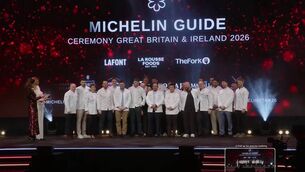Darina Allen: Delicious dishes from the youngest Michelin starred chef in Britain

The Summer 12-week certificate course students had a special treat last week, when Merlin Lebron Johnston from Portland Restaurant in London came as guest chef to The Ballymaloe Cookery School. This gentle young man is the youngest Michelin starred chef in Britain.
His story is intriguing. Merlin had a rocky relationship with school, eventually he was fortunate to be sent to Ashbourne, a progressive school in Devon, where the students in conjunction with the teachers made the decision that going to lessons was not compulsory on the assumption that if they did turn up to class, they would be interested and give it their all.








